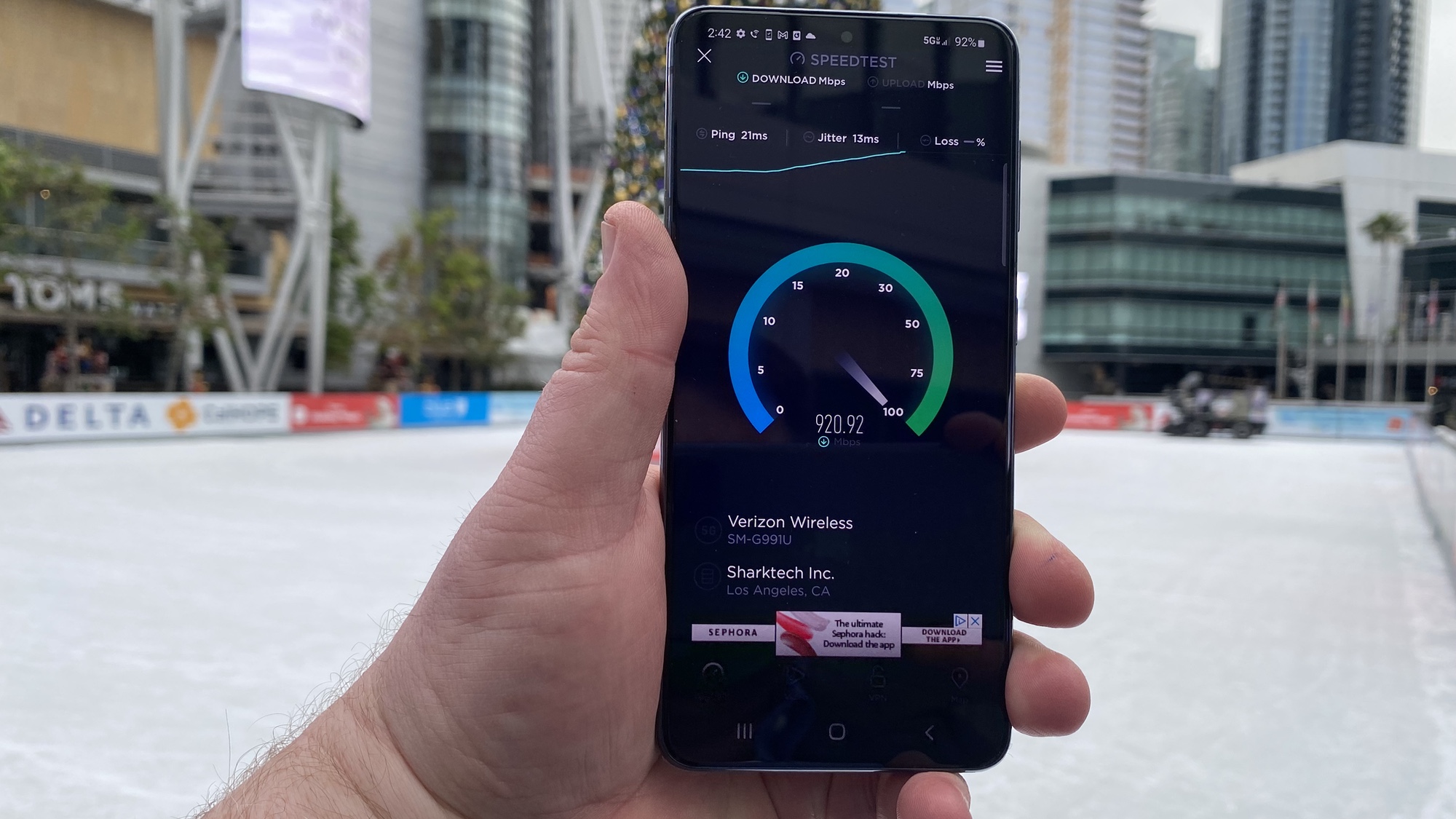Verizon's 5G is about to get a big upgrade — what you need to know
C-Band spectrum to bring faster 5G speeds to 1,700-plus cities this month

Verizon is ready to throw the switch on a revamped 5G network that should deliver super-fast speeds to more of the wireless carrier's subscribers in what could prove to be a very big step for the growth of 5G in the U.S.
Sometime in January, Verizon says it will launch an improved version of its Ultra Wideband network augmented by the C-Band spectrum the carrier won in an auction last year. Up until now, Verizon's Ultra Wideband coverage had relied solely on mmWave-based 5G, which delivers fast speeds but only for limited ranges. mmWave also has a hard time penetrating physical barriers, which makes it hard to pick up a signal indoors.
As a result, Verizon Ultra Wideband had been limited to certain portions of nearly 90 U.S. cities. Verizon augments that with a slower nationwide 5G network that reaches 230 million people. Once Verizon adds its C-Band spectrum to the mix, Ultra Wideband will reach more than 100 million people in 1,700 cities with faster speeds.
How fast? Verizon says the new Ultra Wideband can deliver speeds up to 10x faster than the LTE you might be used to. That translates to download speeds of up to 1 Gbps in some areas.
When Verizon's new Ultra Wideband network goes live, many existing 5G phones will enjoy the faster speeds right away. That includes the iPhone 12 and iPhone 13 as well as Samsung phones like the Galaxy S21, Galaxy Z Fold 3 and Galaxy Z Flip 3.
My experience with C-Band certainly bears that out when I got to try out a test network Verizon had set up in Los Angeles last month. In my limited time with a Verizon test phone, I saw speeds top 1 Gbps on occasion when my LTE-based iPhone 11 Pro was churning out 35 Mbps speeds.
In other instances, Verizon's 5G test network produced a wide range of speeds between 289 Mbps and 849 Mbps — certainly faster than an LTE network's download capabilities. Speeds do vary based on your location, but it should be a noticeably faster experience than what you're used to with LTE.
Sign up to get the BEST of Tom's Guide direct to your inbox.
Get instant access to breaking news, the hottest reviews, great deals and helpful tips.
And that could address one of the major complaints about the 5G rollout so far, where the promises of radically improved performance just hasn't materialized. Initial 5G implementations have relied heavily on sub-6GHz 5G implementations, because those signals have a wider reach. They're also only marginally faster than what LTE produces.
Ultra Wideband delivers peak speeds, but it's been limited to select locations. With C-Band spectrum increasing Ultra Wideband's reach, Verizon is betting that people will finally see the merits of 5G. And if those aren't readily apparent, the wireless carrier has posted a 5G Ultra Show to YouTube, in which assorted celebrities tout the benefits of faster 5G.
Verizon is also doubtlessly hoping that the launch of C-Band boosts its 5G network ahead of what other U.S. carriers have done thus far. In third-party testing, T-Mobile has earned most of the plaudits up until now, as the carrier has combined its own spectrum with what it acquired in its merger with Sprint to produce the best average 5G speeds with the widest reach.
Verizon hasn't provided a specific date for when its revamped 5G service will launch. Rumors had pointed to today (January 4) as a potential launch date, but the day before, Verizon and AT&T agreed to push back any launches at the request of the U.S. Transportation Secretary Pete Buttigieg. (AT&T also acquired C-Band spectrum last year to bolster its own 5G network.)
The Federal Aviation Administration has raised safety concerns about whether C-Band will interfere with safety systems on some airplanes — an argument that Verizon, AT&T and the Federal Communications Commission do not buy. Nevertheless, the January 3 agreement means the carriers will wait two weeks before launching any C-Band enhancements to their 5G networks.
The delay isn't stopping Verizon from revamping plans for wireless phones and home internet, with the carrier planning on launching those new offerings on Wednesday (January 5). We've asked for additional details from Verizon, including whether that will affect pricing for current Verizon phone plans, where offerings that include Ultra Wideband coverage start at $80 a month for a single line.
Verizon says it will offer two new plans for its 5G Home internet service — 5G Home and 5G Home Plus — though pricing and plan details weren't announced. 5G Home Internet plans will be 50% off for customers who also get an Ultra Wideband unlimited data plan from Verizon for their mobile phones.
Make sure you check our Verizon promo codes page for the latest discounts and price cuts.
Philip Michaels is a Managing Editor at Tom's Guide. He's been covering personal technology since 1999 and was in the building when Steve Jobs showed off the iPhone for the first time. He's been evaluating smartphones since that first iPhone debuted in 2007, and he's been following phone carriers and smartphone plans since 2015. He has strong opinions about Apple, the Oakland Athletics, old movies and proper butchery techniques. Follow him at @PhilipMichaels.

